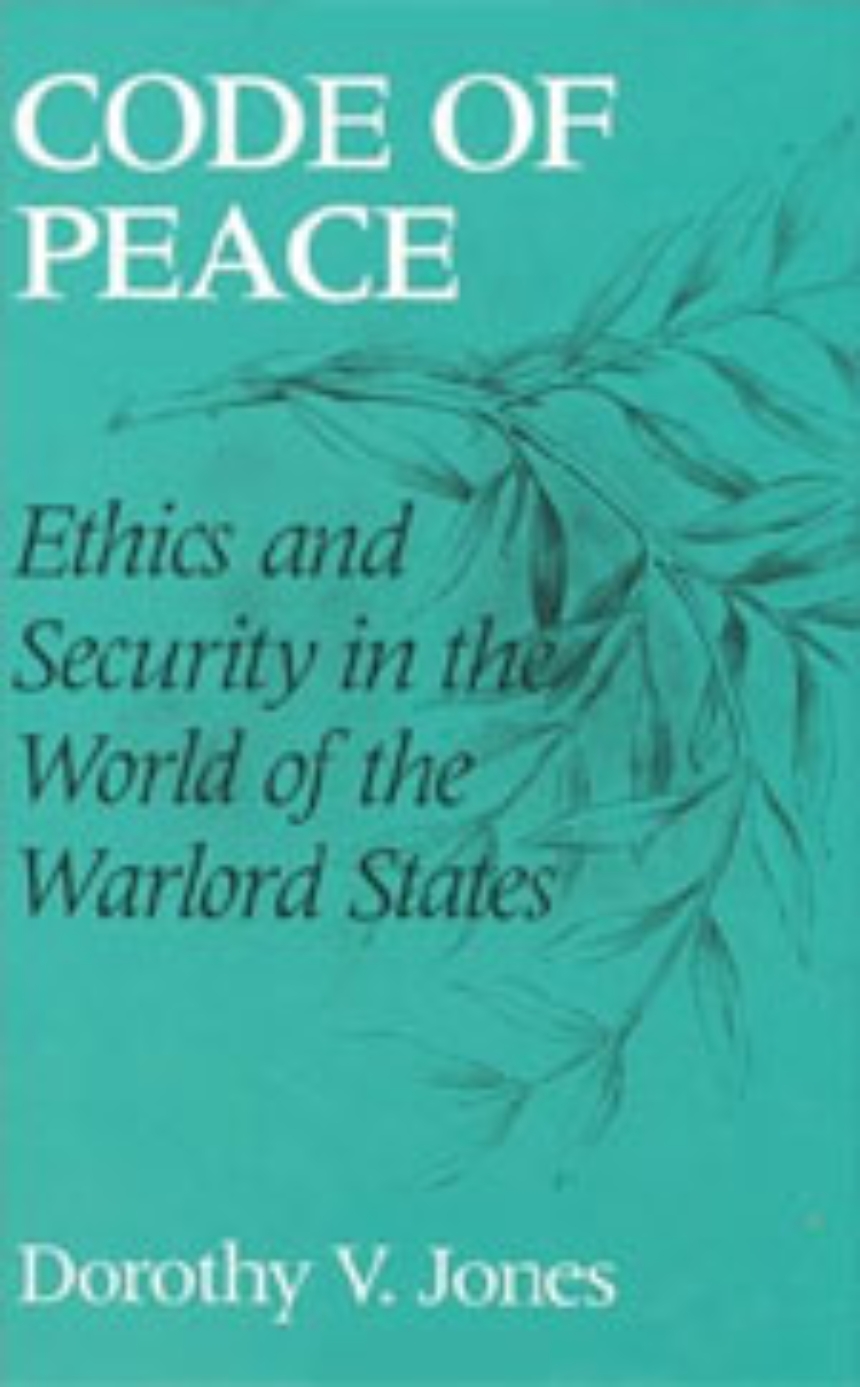Code of Peace
Ethics and Security in the World of the Warlord States
Is it possible, in our world of differing beliefs and diverse cultures, to find an ethical framework that can guide actual international relations? In Code of Peace, Dorothy V. Jones sets forth her surprising answer to this perplexing question: Not only is a consensus on ethical principles possible, but it has already been achieved.
Jones focuses on the progressive development of international law to disclose an underlying code of ethics that enjoys broad support in the world community. Unlike studies that concentrate on what others think that states ought to do, Code of Peace analyzes what states themselves consider proper behavior. Using history as both narrative and argument, Jones shows how the existing ethical code has evolved cumulatively since World War I from a complex interplay between theory and practice. More than an abstract treatise or a merely technical analysis, Jones’s study is grounded in the circumstances of war and peace in this century. Treaties and agreements, she argues, are forging a consensus on such principles as human rights, self-determination, and cooperation between states. Jones shows how leaders and representatives of nations, drawing on a rich heritage of philosophical thoughts as well as on their own experiences in a violent world of self-interested conflict, have shaped their thought to the taming of that world in the cause of peace. That is the striking thing about this code: states whose relations are marked by so frequent a recourse to war that they can fairly be called "warlords" have created and pledged themselves to a code of peace.
The implications of Code of Peace for establishing a normative foundation for peace are profound. Historically sound and timely, impeccably researched and elegantly written, the book will be of immediate and lasting value to anyone concerned with the stability of the modern world.
Jones focuses on the progressive development of international law to disclose an underlying code of ethics that enjoys broad support in the world community. Unlike studies that concentrate on what others think that states ought to do, Code of Peace analyzes what states themselves consider proper behavior. Using history as both narrative and argument, Jones shows how the existing ethical code has evolved cumulatively since World War I from a complex interplay between theory and practice. More than an abstract treatise or a merely technical analysis, Jones’s study is grounded in the circumstances of war and peace in this century. Treaties and agreements, she argues, are forging a consensus on such principles as human rights, self-determination, and cooperation between states. Jones shows how leaders and representatives of nations, drawing on a rich heritage of philosophical thoughts as well as on their own experiences in a violent world of self-interested conflict, have shaped their thought to the taming of that world in the cause of peace. That is the striking thing about this code: states whose relations are marked by so frequent a recourse to war that they can fairly be called "warlords" have created and pledged themselves to a code of peace.
The implications of Code of Peace for establishing a normative foundation for peace are profound. Historically sound and timely, impeccably researched and elegantly written, the book will be of immediate and lasting value to anyone concerned with the stability of the modern world.
226 pages | 6 x 9 | © 1991
History: European History
Law and Legal Studies: International Law
Political Science: Diplomacy, Foreign Policy, and International Relations
Table of Contents
Introduction
Prologue
1. The World the Warlords Made
The Almost Manageable War
Feckless Pursuits
2. The Ethical Heritage
Conflict Resolution and Control
Standards of Social Justice
Human Rights Guarantees
Fundamental Principles of International Life
3. New International Approaches
Laboratories of the League
Hard Cases
A Discourse of Rights
4. Search for Authority
Founders of the Search
Shield and Cloak
The Halfway House
5. States and Peoples
Rhetoric and Structure
Rhetoric and Content
The Permanent Presence
6. Peoples and States
Warders at Large
Rhetoric and Action
The Continuing Process
Appendixes
1. Major International Instruments from Which the Principles of the States’ Ethical Code Are Drawn
2. 1933 Convention on Rights and Duties of States
3. Career Characteristics of International Lawyers, 1918-1983: A Select List of 66 Lawyers from 24 Countries
4. Membership of United Nations Special Committee to Consider the Principles of International Law
Notes
Bibliographic Essay
Index
Prologue
1. The World the Warlords Made
The Almost Manageable War
Feckless Pursuits
2. The Ethical Heritage
Conflict Resolution and Control
Standards of Social Justice
Human Rights Guarantees
Fundamental Principles of International Life
3. New International Approaches
Laboratories of the League
Hard Cases
A Discourse of Rights
4. Search for Authority
Founders of the Search
Shield and Cloak
The Halfway House
5. States and Peoples
Rhetoric and Structure
Rhetoric and Content
The Permanent Presence
6. Peoples and States
Warders at Large
Rhetoric and Action
The Continuing Process
Appendixes
1. Major International Instruments from Which the Principles of the States’ Ethical Code Are Drawn
2. 1933 Convention on Rights and Duties of States
3. Career Characteristics of International Lawyers, 1918-1983: A Select List of 66 Lawyers from 24 Countries
4. Membership of United Nations Special Committee to Consider the Principles of International Law
Notes
Bibliographic Essay
Index
Awards
Lionel Gelber Foundation: Lionel Gelber Prize
Won
American Political Science Association: Woodrow Wilson Foundation Award
Shortlist
